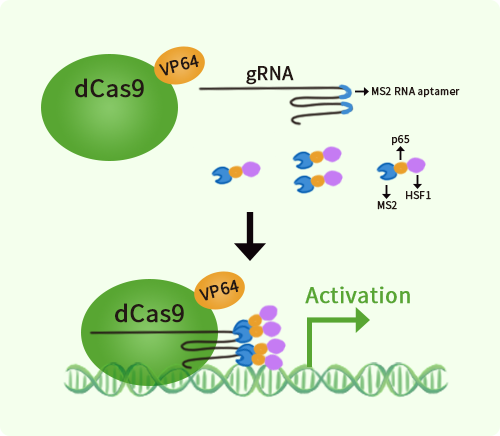Mouse Abraxas2 activation kit by CRISPRa
CAT#: GA212230
Abraxas2 CRISPRa kit - CRISPR gene activation of mouse BRISC complex subunit
CNY 12,255.00
Specifications
| Product Data | |
| Format | 3 gRNAs (5ug each), 1 scramble ctrl (10ug) and 1 enhancer vector (10ug) |
| Symbol | Abraxas2 |
| Locus ID | 109359 |
| Kit Components | GA212230G1, Abraxas2 gRNA vector 1 in pCas-Guide-GFP-CRISPRa GA212230G2, Abraxas2 gRNA vector 2 in pCas-Guide-GFP-CRISPRa GA212230G3, Abraxas2 gRNA vector 3 in pCas-Guide-GFP-CRISPRa 1 CRISPRa-Enhancer vector, SKU GE100056 1 CRISPRa scramble vector, SKU GE100077 |
| Disclaimer | These products are manufactured and supplied by OriGene under license from ERS. The kit is designed based on the best knowledge of CRISPRa SAM technology. The efficiency of the activation can be affected by many factors, including nucleosome occupancy status, chromatin structure and the gene expression level of the target, etc. |
| Reference Data | |
| RefSeq | NM_198017 |
| Synonyms | AA589499; Abro1; AI853413; C430003P19Rik |
| Summary | Component of the BRISC complex, a multiprotein complex that specifically cleaves 'Lys-63'-linked polyubiquitin, leaving the last ubiquitin chain attached to its substrates. May act as a central scaffold protein that assembles the various components of the BRISC complex and retains them in the cytoplasm (By similarity). Plays a role in regulating the onset of apoptosis via its role in modulating 'Lys-63'-linked ubiquitination of target proteins (PubMed:21195082). Required for normal mitotic spindle assembly and microtubule attachment to kinetochores via its role in deubiquitinating NUMA1. Plays a role in interferon signaling via its role in the deubiquitination of the interferon receptor IFNAR1; deubiquitination increases IFNAR1 activities by enhancing its stability and cell surface expression (PubMed:24075985, PubMed:26344097). Down-regulates the response to bacterial lipopolysaccharide (LPS) via its role in IFNAR1 deubiquitination (PubMed:24075985). Required for normal induction of p53/TP53 in response to DNA damage. Independent of the BRISC complex, promotes interaction between USP7 and p53/TP53, and thereby promotes deubiquitination of p53/TP53, preventing its degradation and resulting in increased p53/TP53-mediated transcription regulation and p53/TP53-dependent apoptosis in response to DNA damage (By similarity).[UniProtKB/Swiss-Prot Function] |
Documents
Resources
| 基因表达相关资源 |
Other Versions
| SKU | Description | Size | Price |
|---|---|---|---|
| KN505599 | Fam175b - KN2.0, Mouse gene knockout kit via CRISPR, non-homology mediated. |
CNY 8,680.00 |
其它Abraxas2产品


 United States
United States
 Germany
Germany
 Japan
Japan
 United Kingdom
United Kingdom
 China
China

